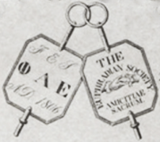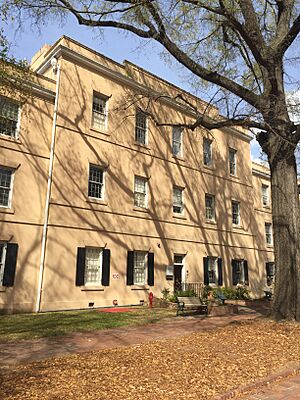Euphradian Society facts for kids
Quick facts for kids Euphradian Society |
|
|---|---|
| ΦΑΕ | |
 |
|
| Founded | February 1806–1862; 1866–1873; 1882-1986; 2010 University of South Carolina |
| Type | Literary society |
| Affiliation | Independent |
| Emphasis | debate |
| Scope | Local |
| Chapters | 1 |
| Headquarters | Columbia, South Carolina United States |
The Euphradian Society, also known as Phi Alpha Epsilon (ΦΑΕ), is a special club for debating and literature. It was started in 1806 at the University of South Carolina. Back then, the university was called South Carolina College.
Contents
History of the Euphradian Society
The Euphradian Society began when another club, the Philomathic Society, split up. The Philomathic Society had almost all the students at the college when it started in 1805. In February 1806, the members decided to form two separate groups. One became the Euphradian Society, and the other was the Clariosophic Society. They even flipped a coin to decide which club students would join! Later, students joined a club based on where they lived.
The Euphradian Society was also known by its Greek letters, Phi Alpha Epsilon. We don't know much about how they chose this name because their old meeting notes are missing. The first president was William Harper. Other leaders included a vice president, secretary, and treasurer. The state of South Carolina officially recognized the society on December 20, 1820.
Challenges and Comebacks
The society stopped meeting on February 25, 1862, because of the Civil War. After the war, former members and supporters helped restart the Euphradian Society on January 13, 1866. An alumnus named Robert W. Shand was president for a short time until students took over. However, money problems in the South after the war made it hard for the society to be as successful as before.
In the 1870s, during a time of political change, the society became inactive again. A group called the Lambda Delta Epsilon committee was put in charge. They were tasked with protecting the society's important documents and even selling furniture if needed. They also worked to keep the society's name and history safe during a difficult time. A committee member, Colonel Fitz W. McMaster, took the society's records to keep them secure.
Colonel McMaster tried for nine years to get the society going again, but it was tough. Another club, the Ciceronian Society, even took over some of the Euphradian's rooms. The Euphradian's library lost some books and had damage during this time. But after a year, new rules helped protect the society's valuable old books. Finally, McMaster successfully restarted the society on February 19, 1882.
However, by 1986, the society was no longer active. Its space at Harper College was renamed the Gressette Room, honoring Marion Gressette, a former member and state politician. In 2010, the Euphradian Society was brought back to life by its alumni, meaning former students who were members.
Symbols and Traditions
The name "Euphradian" means "good speech" or "speaking clearly." In 1815, the society adopted a special, secret way of doing things.
The society's badge was a six-pointed star. It had the Greek letters ΦΑΕ, the year 1806, and the motto "Amicitiae Sacrum" (which means "Sacred to Friendship"). The society also had a gold key. This key showed two hands clasping, with the words "Euphradian Society" and the motto "Amicitiae Sacrum" below.
Society Hall
At first, the Euphradian Society met in the College Chapel. In 1820, they got their own rooms on the third floor of DeSaussure College. This space was not just for meetings; it also held the society's large collection of books.
After the college expanded in 1848, the leaders of the college gave the society space on the third floor of Harper College. The society decorated this new area, and it was officially opened on December 7, 1848. A member and professor named James H. Thornwell gave a speech. Someone who visited the hall said it was "beautiful, attractive, brilliant, and imposing." They added that it was "overwhelming" for a young person from the countryside to see such a dazzling place.
Activities and Debates
The Euphradian Society held its meetings on Saturday nights after dinner. These meetings always included at least one formal debate. Topics for the debates were given out two weeks in advance, so members had plenty of time to prepare. Also, one member was chosen each month to give a long speech.
The society often debated with other clubs on campus. They discussed important social and political issues of the day.
Notable Members
Many important people were part of the Euphradian Society. Here are a few:
- Robert Woodward Barnwell – A United States Senator.
- William H. Brawley – A United States representative and judge.
- James Henry Carlisle – President of Wofford College.
- William Alexander Graham – Governor of North Carolina and a United States Senator.
- Marion Gressette – A politician.
- William Harper – A United States Senator and the society's first president.
- Robert E. Lee (Honorary) – A famous general.
- Francis Lieber – A legal expert and professor.
- John Lawrence Manning – Governor of South Carolina.
- James Rion McKissick – A journalist, lawyer, and president of the University of South Carolina.
- Gilbert du Motier, Marquis de Lafayette (Honorary) – A French general and politician.
- William C. Preston – A United States Senator and president of the University of South Carolina.
- J. Marion Sims – A pioneering surgeon.
- James Henley Thornwell – A theologian and professor.
 | John T. Biggers |
 | Thomas Blackshear |
 | Mark Bradford |
 | Beverly Buchanan |


